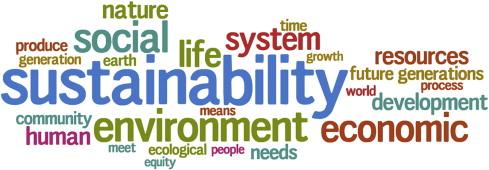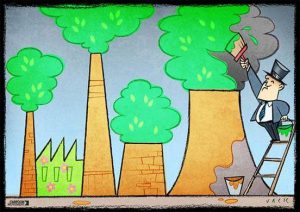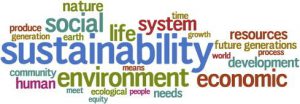What does sustainability mean for the Green Office?
Sustainability: It’s all we can talk about at the Green Office. Our goal is to make the university more sustainable. But now is the time to get a little bit self-critical: Do we actually know what we are talking about when we use the word sustainable? If someone would ask me: ‘What does sustainability mean?’ I wouldn’t be able to answer that. At least, not in one single sentence. Before I can start about what Green Office means when talking about sustainability, you first have to understand how the term ‘sustainable’ came to life.
The idea of sustainable development was introduced in the famous Bruntland report ‘our common future’ in 1987. The report was a response to environmental problems at that time. They defined sustainable development as: “development which meets the needs of the present without compromising the ability of future generations to meet their own needs”. Since the launch of the term sustainable development, which is currently already 32 years old, sustainability and sustainable development have been defined in many different ways.
Another very well-known definition is the three P’s definition, which stands for: people, planet and prosperity or as some companies like to call it: people, planet and profit. As you see, there already is a discussion about the last word, should it be profit or prosperity? This illustrates the pitfall of not having one definition of sustainability; it allows people to adjust the meaning to their own advantage. A good example of this is green washing. This is when companies act like their products and services are sustainable, but in fact they are damaging the environment.
We think the word sustainability shouldn’t be used as a way for companies, governments and people to justify and continue business as usual. But then, would the solution be developing a single definition of sustainability? Or getting rid of the concept of sustainability completely?
By now, there is so much talk about sustainability in both media and education that most people have heard about sustainability and have developed their own ideas of what sustainability is about. For a company owner it might mean making profit while trying to minimize environmental damage, for the minimalist it means only buying things that you really need and for a house-building company it might mean building an energy-neutral house. So, sustainability doesn’t has the same meaning for everyone.
Is this a problem? I don’t think so. Developing one definition of sustainability is practically unfeasible and doesn’t provide space for learning from new understandings about what sustainability should entail. I think we can all learn from each other’s ideas about sustainability by sharing, talking and keep adapting our view on sustainability as we age as a society and learn and gain new insights.
Mark White also thought that we shouldn’t force society to adopt one solid, never changing definition of sustainability. Instead, he embraced the idea of multiple understandings of sustainability by creating a word cloud which includes over a two hundred definitions of sustainability. The result is the image shown below. The biggest words are most in the definitions of sustainability and the smaller words less. This images gives an idea of what sustainability is about, but still leaves space for interpretations and discussion.
So, the answer to the question ‘What does sustainability mean for the Green Office?’ cannot be answered by giving one definition. Instead, we decide if something is sustainable by having continuing, critical dialogues with our team, our network and of course also ourselves. In this way, we can keep changing our sustainable ‘word cloud’ without becoming a green washing office.
We are curious what you think about sustainability. Is the concept useful for change or just used to justify business as usual? Do we need one definition to have a clear idea what sustainability is about? Have you personally experienced a shift in your view on sustainability?
By: Robin van der Sluijs
Sources and further reading:
- 1. White, M. A. (2013) Sustainability: I know it when I see it.
https://www.sciencedirect.com/science/article/pii/S0921800912005034#f0010 - Sneddon, C., Howart, R. B., Norgaard, R. B. (2006) Sustainable development in a post-Brundtland world. https://www.sciencedirect.com/science/article/pii/S0921800905002053
- Furlow, N. E. (2010) Greenwashing in the new millennium. http://www.m.www.na-businesspress.com/JABE/jabe106/FurlowWeb.pdf


